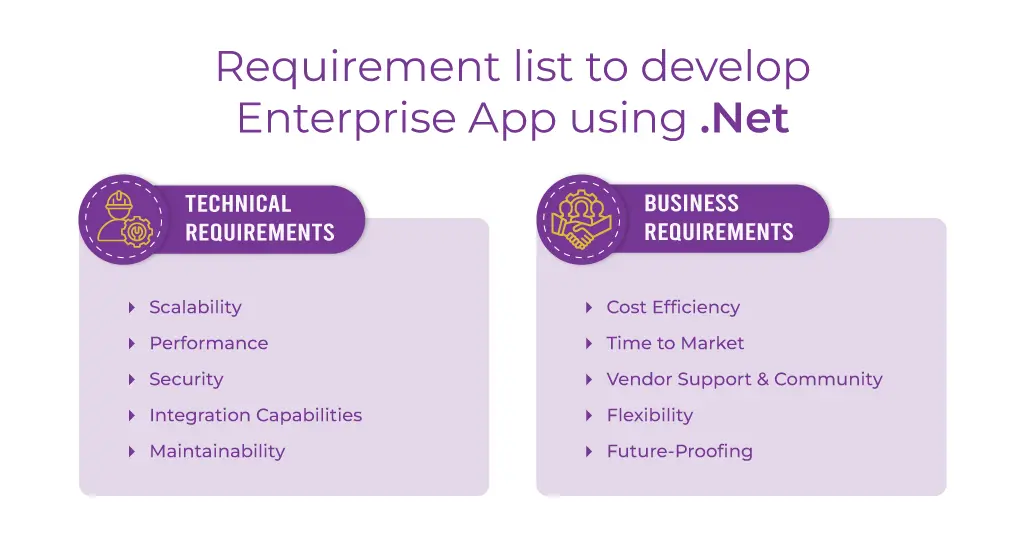If you have a small business and you want to take it online – what are your options?
Well, you have multiple online marketplaces that you can choose from and with a little customization that you can do yourself, you can start selling online!
And if that doesn’t work for you, you can always use WordPress to create an online presence and make things work – right?
But what if you have a business idea that can scale so high that a WordPress application won’t suffice – not even for a while?
What would you do?
What readymade application are you going to use, especially if you have a unique business idea that needs custom enterprise software?
In this case, the only option you are left with – is to have your own application developed based on your unique needs.
A viable option – as you can always find a bespoke software development company that can help you develop your business application.
But what technology is best to power such an application?
As a custom software development company, we often get asked this question. We like to provide all the options to our clients, but we always narrow it down to one option – .NET!
Yes – and we don’t just say it.
Our experts have developed applications using this technology and have witnessed the sheer performance, stability, and scalability that .NET brings and that too consistently.
But what made this technology become a preferred choice for enterprise-grade applications?
Time to get some real scoop on what potential this technology holds!
Enterprise Software Development Requirements: How does Dot Net fit them all?
When enterprises decide to develop large-scale, high-performance applications, they need a technology stack that meets both technical and business requirements.
Over the years Microsoft’s .NET framework has emerged as a top choice for these needs because .NET fits perfectly for both technical and business needs an enterprise can have to feature it in their custom app.
Let’s look into them one by one.

Technical Requirements for Enterprise App Development
1. Scalability
What’s the Need -Enterprises need their applications to handle increasing data loads and user interactions without slowing down or crashing. A scalable technology that ensures that as your app grows, it can handle more traffic and transactions smoothly.
How .NET helps
- Horizontal Scaling – .NET allows you to scale your applications horizontally by distributing workloads across multiple servers. This is easy to manage with cloud platforms like Microsoft Azure, which offers scalable options to handle growing demands.
- Load Balancing – It includes built-in load balancing, which spreads user requests evenly across servers, so no single server gets overwhelmed and affects an application as a whole.
- Microservices – .NET supports microservices architecture, breaking your application into smaller, independently deployable services that can each scale on their own.
2. Performance
What’s the Need – Performance is critical for ensuring your application responds quickly and processes efficiently, especially under heavy load or with large datasets.
How .NET helps
- Just-In-Time (JIT) Compilation – The JIT compiler in .NET optimizes code execution at runtime, so your application only compiles the parts of code it needs, boosting performance.
- Asynchronous Programming – .NET’s async/await model helps keep your application responsive by handling operations in the background without blocking the main thread.
- Garbage Collection – Automatic memory management through garbage collection reduces the risk of memory leaks and improves overall application performance.
3. Security
What’s the Need – For enterprise applications, security is a top priority to protect sensitive data and meet regulatory requirements.
How .NET helps
- Built-in Security Features – .NET provides role-based access control, secure authentication, and data encryption to protect against security threats.
- Compliance – It supports compliance with standards like GDPR and HIPAA, helping you adhere to industry regulations through its security libraries and practices.
- Code Access Security – The Code Access Security (CAS) model in .NET enforces strict permissions, ensuring that code runs only within designated security boundaries.
4. Integration Capabilities
What’s the Need – Enterprise applications often need to interact with existing systems, databases, and third-party services for seamless operation.
How .NET helps
- Extensive Libraries and APIs – .NET offers a vast range of libraries and APIs for connecting with various data sources and services, including RESTful APIs and SOAP.
- Entity Framework – This ORM tool simplifies database interactions, supporting different database systems and making data integration smooth.
- Service-Oriented Architecture (SOA) – .NET’s support for SOA allows your application to communicate with other services and systems using standard protocols.
5. Maintainability
What’s the Need – Enterprise applications must be easy to maintain and adapt as business needs and technologies evolve.
How .NET helps
- Modular Design – .NET’s modular architecture promotes reusable code and makes it easier to update or replace parts of your application independently.
- Dependency Injection – This feature helps manage code dependencies more effectively, supporting loose coupling and easier testing.
- Comprehensive Documentation and Tools – With tools like Visual Studio and detailed documentation, .NET enhances code maintainability and developer productivity.
Business Requirements for developing enterprise applications
1. Cost Efficiency
What’s the Need – Enterprises want to optimize their budgets while ensuring they get high-quality development and operational efficiency.
How .NET helps
- Open-Source Components – Many .NET components, including .NET Core, are open-source, which helps reduce licensing costs.
- Cloud Integration – .NET’s seamless integration with Microsoft Azure provides cost-effective cloud services, cutting down the need for expensive on-premises infrastructure.
- Development Tools – Visual Studio’s extensive tools and features streamline development, saving time and reducing costs.
2. Time to Market
What’s the Need – Speed is crucial for staying competitive. Enterprises need to develop and deploy applications quickly.
How .NET helps
- Rapid Development Framework – With a rich set of pre-built libraries and templates, .NET speeds up development so you can focus on core business logic.
- Automated Testing – Integrated tools like NUnit and xUnit support automated testing, helping you develop and deploy faster.
- CI/CD Support – .NET’s support for Continuous Integration and Continuous Deployment (CI/CD) ensures smooth and frequent updates, reducing the time to market efficiently.
Another technology that helps develop Enterprise Apps faster is Laravel. With its robust pre-build functionalities, it reduces the overall development time of an application
3. Vendor Support and Community
What’s the Need – Strong vendor support and an active community are valuable for troubleshooting, updates, and enhancements.
How .NET helps
- Microsoft Support – As a Microsoft product, .NET benefits from comprehensive support, including regular updates and enterprise-level assistance.
- Active Community – The .NET ecosystem is supported by a vibrant community of developers and experts, providing a wealth of resources and third-party tools.
4. Flexibility
What’s the Need – Enterprises need flexibility to adapt their applications to changing business demands and technological advancements.
How .NET helps
- Cross-Platform Development – .NET Core and newer versions highly support cross-platform development, allowing your apps to run on Windows, Linux, and macOS.
- Multiple Programming Languages – .NET supports languages like C#, F#, and VB.NET, letting developers choose the best one for their projects.
5. Future-Proofing
What’s the Need – Enterprises need to ensure their technology choices are sustainable and capable of evolving with future advancements.
How .NET helps
- Regular Updates and Evolution – Microsoft regularly updates .NET with new features and improvements, ensuring it remains current and relevant.
- Backward Compatibility – .NET’s backward compatibility ensures that your existing applications remain functional while you upgrade to newer versions.
These are just a few of the capabilities that .NET has, which makes it worth considering.
It has robust feature set, combined with cost efficiency and strong support, making .Net an excellent choice for enterprises looking to build top-notch solutions.
Conclusion
It might seem like a biased opinion to just give you a name like that – but as a development company, we have seen the potential of .NET for Enterprise Grade Applications firsthand.
Many applications – especially the modern ones – have been built using this and have remained Class Applications For Years!
Now you may ask – Is it so that these applications never had or will never have any issue?
Then our answer would be plain and simple –
There is no such technology ever made that never require a little maintenance or upgrade…
And there is no such business that never grows or never needs more than what is provided!
As your business evolves – so does your application – and so does the need to adjust or further develop new features accordingly!
And as a .NET Development Company – we can assure you that .NET is going to be that supportive companion at each step of your custom enterprise software development.
It will consistently power and protect your application and business eventually!
Need Expert .NET Developers to Elevate Your Enterprise Application?
Choose a team that combines Expertise with Fresh Perspective!
At Covrize, we blend the experience of seasoned professionals with the dynamic energy of emerging talent.
Our developers are not only adept at developing complex enterprise applications but also bring a flexible, forward-thinking approach to every project.
Connect with us – and get to know how we can help you drive your business forward with an application that is built based on your unique vision!







